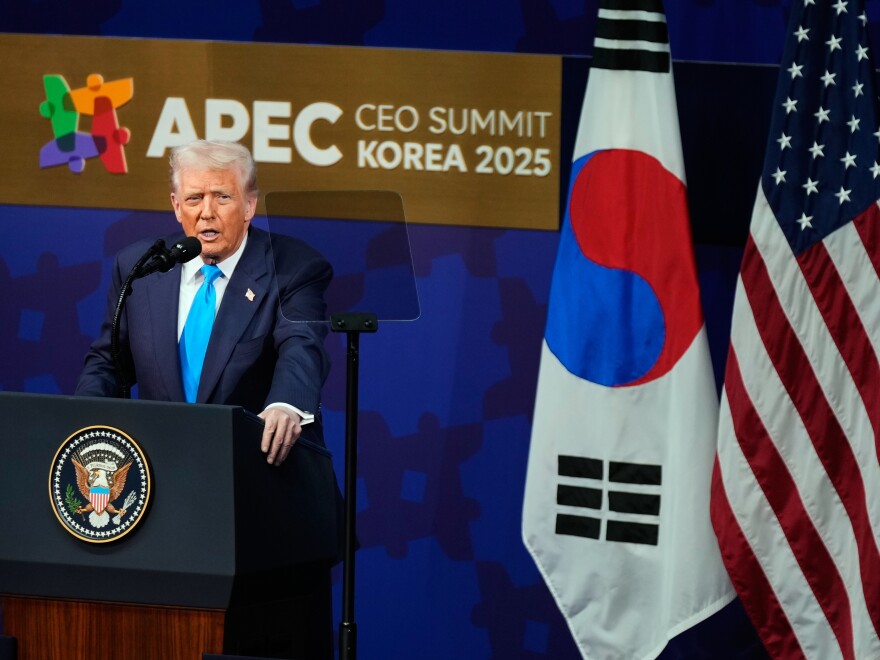Politics
Trump Optimistic Ahead of Key Meeting with Xi Jinping

President Donald Trump expressed confidence in reaching a significant trade agreement with Xi Jinping, the leader of China, during their upcoming bilateral meeting at the Asia Pacific Economic Forum (APEC) in Gyeongju, South Korea. Speaking to a group of business executives on March 15, 2025, Trump emphasized the potential benefits of a deal, stating, “I think we’re going to have a deal, I think it will be a good deal for both, and that’s really a great result.”
Trump’s remarks come at a time of heightened trade tensions between the two nations, which have threatened to escalate into broader economic conflicts. He highlighted the importance of dialogue, noting, “That’s better than fighting and going through all sorts of problems.” The meeting is scheduled for March 16, 2025.
In his discussion, Trump indicated that he is open to reducing tariffs on Chinese imports in exchange for China taking measures to limit the export of chemicals used in the production of fentanyl. “I expect to be lowering that because I believe that they’re going to help us with the fentanyl situation,” he told reporters while en route to Gyeongju. The United States currently imposes a 20% tariff on various Chinese goods, alongside additional tariffs, due to concerns that China has not adequately restricted the export of fentanyl precursors.
In retaliation, Beijing has imposed tariffs on U.S. soybeans, impacting American farmers and the broader agricultural sector. Recent negotiations between U.S. and Chinese economic officials in Malaysia aimed to establish a framework for a potential trade deal, which could see China increase its purchases of U.S. soybeans. In return, China may delay implementing new restrictions on rare earth exports, while the United States would refrain from raising tariffs further.
Tensions have escalated, with both nations accusing each other of employing economic coercion that disrupts the global economy. Treasury Secretary Scott Bessent commented on China’s rare earth export controls, saying, “This is China versus the world.” He warned that China is threatening the supply chains of the entire international community.
The U.S. has not only raised tariffs but also increased port fees on Chinese-owned vessels docking at American ports. There are discussions surrounding potential controls on U.S. software exports to China, as well as proposed restrictions on Chinese air carriers using Russian airspace for flights to and from the United States.
Zhu Feng, dean of the School of International Studies at Nanjing University, criticized the U.S. approach, stating, “You can make China accept your rise in tariffs. But you can’t keep overwhelmingly pounding on China so hard.” He suggested that such strategies risk provoking stronger retaliation from Beijing.
In addition to trade discussions, Trump has expressed interest in addressing nuclear arms control with Xi, potentially including China in ongoing U.S.-Russia negotiations. Despite earlier speculation regarding reviving talks with North Korean leader Kim Jong Un, Trump clarified that his primary focus during this visit is on the discussions with Xi.
During his meetings in South Korea, Trump acknowledged the ongoing tensions on the Korean Peninsula, assuring South Korean President Lee Jae Myung that he would work diligently to address the situation. As Trump was in South Korea, North Korea reported successful tests of cruise missiles, underscoring the complex dynamics at play in the region.
The outcomes of the Trump-Xi meeting could have significant implications for international trade relations and regional stability, as both nations navigate their intricate economic and political ties.
-

 World2 weeks ago
World2 weeks agoGlobal Air Forces Ranked by Annual Defense Budgets in 2025
-

 World2 weeks ago
World2 weeks agoMass Production of F-35 Fighter Jet Drives Down Costs
-

 Top Stories2 weeks ago
Top Stories2 weeks agoNew ‘Star Trek: Voyager’ Game Demo Released, Players Test Limits
-

 Science2 weeks ago
Science2 weeks agoTime Crystals Revolutionize Quantum Computing Potential
-

 Top Stories2 weeks ago
Top Stories2 weeks agoDirecTV to Launch AI-Driven Ads with User Likenesses in 2026
-

 World2 weeks ago
World2 weeks agoElectrification Challenges Demand Advanced Multiphysics Modeling
-

 Entertainment2 weeks ago
Entertainment2 weeks agoFreeport Art Gallery Transforms Waste into Creative Masterpieces
-

 Lifestyle2 weeks ago
Lifestyle2 weeks agoDiscover Reese Witherspoon’s Chic Dining Room Style for Under $25
-

 Health2 weeks ago
Health2 weeks agoGavin Newsom Critiques Trump’s Health and National Guard Plans
-

 Lifestyle2 weeks ago
Lifestyle2 weeks agoLia Thomas Honored with ‘Voice of Inspiration’ Award at Dodgers Event
-

 Entertainment2 weeks ago
Entertainment2 weeks agoFast & Furious Coaster Hits the Track at Universal Studios
-

 Science2 weeks ago
Science2 weeks agoWaning Crescent Moon: What to Expect on October 17









